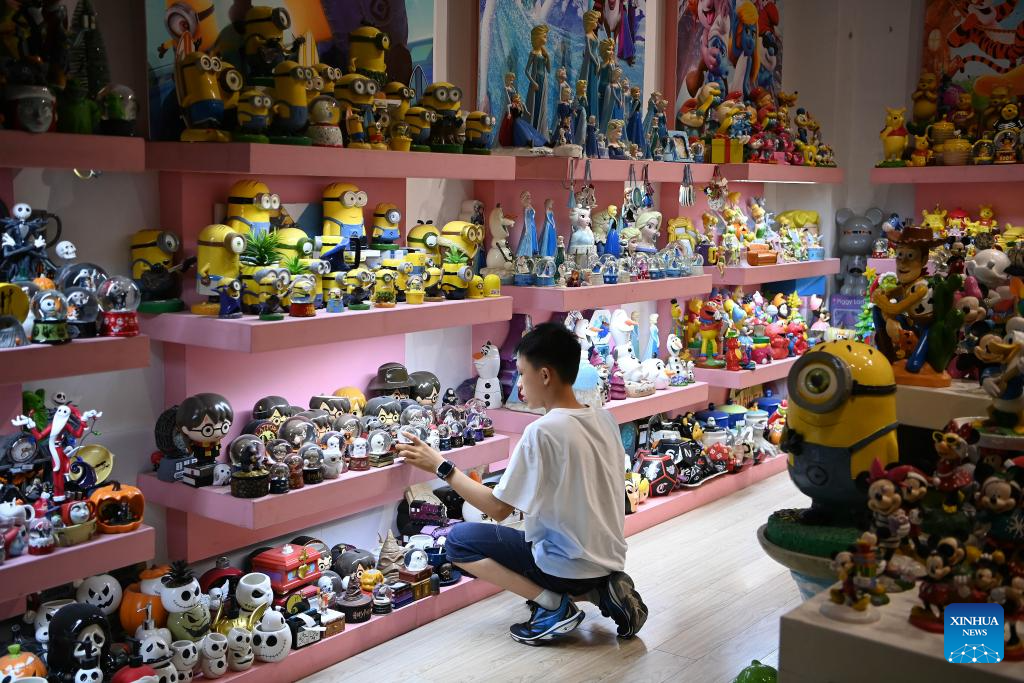




- BRNN
- BRI News
- BRNN News
- Database
Official Documents Polices and Regulations
Inter-government Documents International Cooperation BRI Countries
Business Guide Economic Data BRI Data
Trade
Investment Projects Latest projects
Cases - Content Pool

A boy learns about porcelain artworks exhibited at Quanzhou Shunmei Group Co., Ltd. in Dehua county, southeast China's Fujian Province, Aug. 20, 2025. (Xinhua/Xiao Xiao)
Dehua county, located in Quanzhou City, southeast China's Fujian Province, is one of China's largest production and export hubs for ceramic handicrafts. It is not only preserving its traditions but also injecting continuous momentum into its ceramic industry.
Home to more than 4,500 ceramics enterprises, Dehua exports ceramic products to over 190 countries and regions, generating an annual output value of 66 billion yuan ($9.27 billion).
Dubbed "Blanc de Chine," White from China, by the French, Dehua porcelain has long enjoyed great popularity worldwide for its jade-like texture, mirror-like sheen, superb craftsmanship, and crisp, resonant sound, serving as a calling card of the county.
Today, Dehua porcelain shines brighter with renewed charm and vitality, a result of the sustained efforts made by local ceramics firms to keep innovating and diversifying their product lines.
Among the many companies that have reimagined porcelain in innovative ways, some have successfully captivated global consumers through novelty cups with unconventional designs — some decorative, some practical — of which Dehua supplies 80 percent of the global total output.
By virtue of their strong capacity to turn a simple sketch or idea into a market-ready product, ceramics companies in Dehua are attracting orders from around the world.
Self-designed products, especially ceramics incorporating Chinese cultural elements, have also witnessed growing popularity among international consumers.
Increasingly, Dehua firms are setting trends rather than just following.
Instead of manufacturing products according to basic outlines from its German customers, a local company has supplied its partners with multiple independently developed products this year, such as ornaments that can function as lamps.
The products will enter the German market in October and are expected to be very popular among consumers, according to the company.
Thanks to continuous innovation, many local ceramics companies have enjoyed steady growth and secured robust demand, even amid international trade frictions.
"When tariffs rose, we asked our customers if they wanted to cancel orders, and they said absolutely not," said Lin Liangbi, an executive of a local ceramics company.
The company has spent over a decade making only ceramic ornaments in the shape of trees, developing more than 4,000 variations and increasing its sales by eight times.
Through relentless innovation, the company's sales surged from 500,000 pieces in 2012 to over 4 million today, with more than 4,000 variations developed and over 50 million pieces exported in total.
"When your products are so good that foreign buyers would rather skip a meal than stop buying your products, you don't need to worry about losing customers, however fluctuating the market is," Lin said.
High quality is becoming an important selling point of Dehua ceramics.
Traditionally, porcelain tableware is fragile, but some Dehua firms now offer five-year warranties on their daily-use ceramics.
A ceramics company labels all its products with the date of manufacture and has staff members repeatedly drop test its ceramics in-store to demonstrate their resilience.
"This bowl can withstand minor bumps or knocks without breaking. Under normal use, it can be used up to 5,000 times, or for five years, while maintaining its original gloss," said Xiao Chunlian, operations and development manager of the company.
The company's confidence in its products stems from five years of research and development, as well as its significant efforts in quality management.
The company has developed a unique clay formula for shatter-resistant porcelain, established automated production lines, and employed AI-powered quality inspection equipment.
Innovation in the ceramic industry of Dehua also extends to smaller decorative items.
A local firm has adopted ultraviolet light to instantly dry and solidify ink as it's being applied to ceramics, replacing manual painting with fully automated coloring and boosting efficiency tenfold.
The company now produces up to 100,000 porcelain fridge magnets every day.
With its self-developed 3D printing technology, it has created increasingly lifelike designs that have quickly found favor in cultural tourism markets.
"We have collaborated with relevant organizations in cities across the country, including Xi'an, Chongqing, Luoyang, and Jingdezhen, to develop numerous products, achieving sales of several million units," said Luo Yan, an executive of the company.

Tel:86-10-65363107, 86-10-65368220, 86-10-65363106